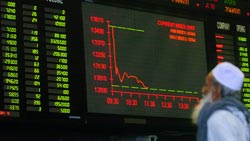
Pakistan pursuing progress and prosperityThe great Chinese philosopher Confucius had said that he who will not economize will have to agonize. Economic soundness of a nation is vital for its survival. Nowadays wars are planned, waged and won through economic diplomacy. Being conscious of the ground realities, the government has devised and pursued a multi-pronged strategy to strengthen the economic edifice of the country and to ameliorate the lot of the people. Its efforts have not gone unrewarded. The factors contributing to political vitality and economic growth have been continuity of policies, dynamic, innovative and participative leadership, good governance, encouraging investment opportunities and attractive cost of doing business. With a deep sense of patriotism, result-oriented approach, the leadership has indeed been able to inspire public trust through integrity, probity and prudence.
The continuous fiscal and monetary policies, of course, have successfully liberalized, deregulated and reformed economic regime to attain equity and fairness in the market. The government has ensured supplies of essential commodities at reasonable prices to alleviate the suffering and privation of the common man. Efforts are on to restrict consumer price index inflation to a single digit. Overall size of the development expenditure has been enhanced. Huge investments have been made in education, health, population welfare, protection of environment and access to credit. Other tangible measures include establishment of the Ministry of Textile Industry, setting up of Industrial Parks, high quantum of investment in scientific education, improved infrastructure in line with the World Trade Organization (WTO) standards. Key infrastructure like water storage, power generation, roads, railways, ports, airports and telecommunication has been developed. Natural resources have been developed to curtail reliance on imports. The indigenous production of defence equipment has also contributed to the national foreign exchange earnings. Ministry of Industries has established National Industrial Parks Development and Management Company (NIPS) having public-private partnership for setting up world standard industrial parks through out the country. Small and Medium Enterprise Development Authority (SMEDA) has initiated "Aik Hunar Aik Nagar" (one village one product) on the Thai model of one Tambon one product. Another significant programme is the Khushhal Pakistan Programme. This comprises small development schemes carried out as recommended by the public representatives. These include electrification of villages, provision of natural gas, supply of potable water and construction of roads connecting farms with markets. Poverty reduction programme has been intensively launched and is being vigorously implemented. As agricultural growth is considered to contribute most towards poverty reduction and job generation, agricultural growth is another important sector the government is focusing on to accelerate the pace of progress. Services sector has also reflected a remarkable upsurge in telecom sector, banking, insurance and wholesale and retail trade. A quality culture has been created to beat the international competition. Headway has been made in fighting economic and cyber crimes through a continuous campaign. These apart from damaging the reputation of the country impede foreign investment. Unrelenting government efforts have culminated in boosting the economy. The size of the Pakistan economy has soared to US$100 billion. The economy registered a growth of 8.4% in the real Gross Domestic Product (GDP) during the last fiscal year. It went up from 6.4% in 2003 to 8.4%. There has been an average of 7% annual growth rate, reflecting fastest pace in two decades. Thus Pakistan became the second fastest growing economy after China. Growth target of around 7% is expected to be achieved during the current fiscal year. Annual per capita income has reached US$847. The revenue collection target of Rs.835 Billion fixed for the current financial year is likely to be achieved. Exports jumped to US$16.16 billion in 2006 while imports reached US$28.61 billion. Foreign Exchange Reserves have gone up to US$13.13 billion. There has been a substantial increase in the Foreign direct Investment (FDI). FDI is likely to touch US $6 billion during the current fiscal year which is much higher than US$3.8 billion during the last year. All sectors have been opened to FDI 100% foreign ownership and protection has been guaranteed. The government has introduced Alternate Dispute Resolution (ADR) mechanism to encourage foreign entrepreneurs. Budget for Education is being raised from 2.6% to 4% of (GDP). The country's literacy ratio is expected to touch 65% by 2010 from the present 53%. Privatization through fair and transparent manner realized Rs.395.238 billion during January 2001 to May 2006. The sale of 26% shares of Pakistan Telecommunication Company (PTCL) was a distinct transaction. Pakistan's Debt liability declined by US$1.28 Billion from US$37.9 billion to US$36.62 in 2005. Citizens have been empowered through devolution plan. To bring about a qualitative change in the social fabric of the society, solid efforts are underway to bridge the gender gap and to empower the women fold. Pakistan has been able to attain the coveted position by promoting political, economic and trade relations amongst the comity of nations. At home, provision of level-playing field to all segments of business and trading community has unfolded multiple business avenues. Through a sustained process of reforms and restructuring, the benefits accruing from the economic progress have been passed on to all strata of the society. |
|| Front
Page | News | Editorial | Columns | Sports | Plus | Financial
Times | International | Mirror | TV
Times | Funday
Times || |
| |
Copyright
2007 Wijeya
Newspapers Ltd.Colombo. Sri Lanka. |
